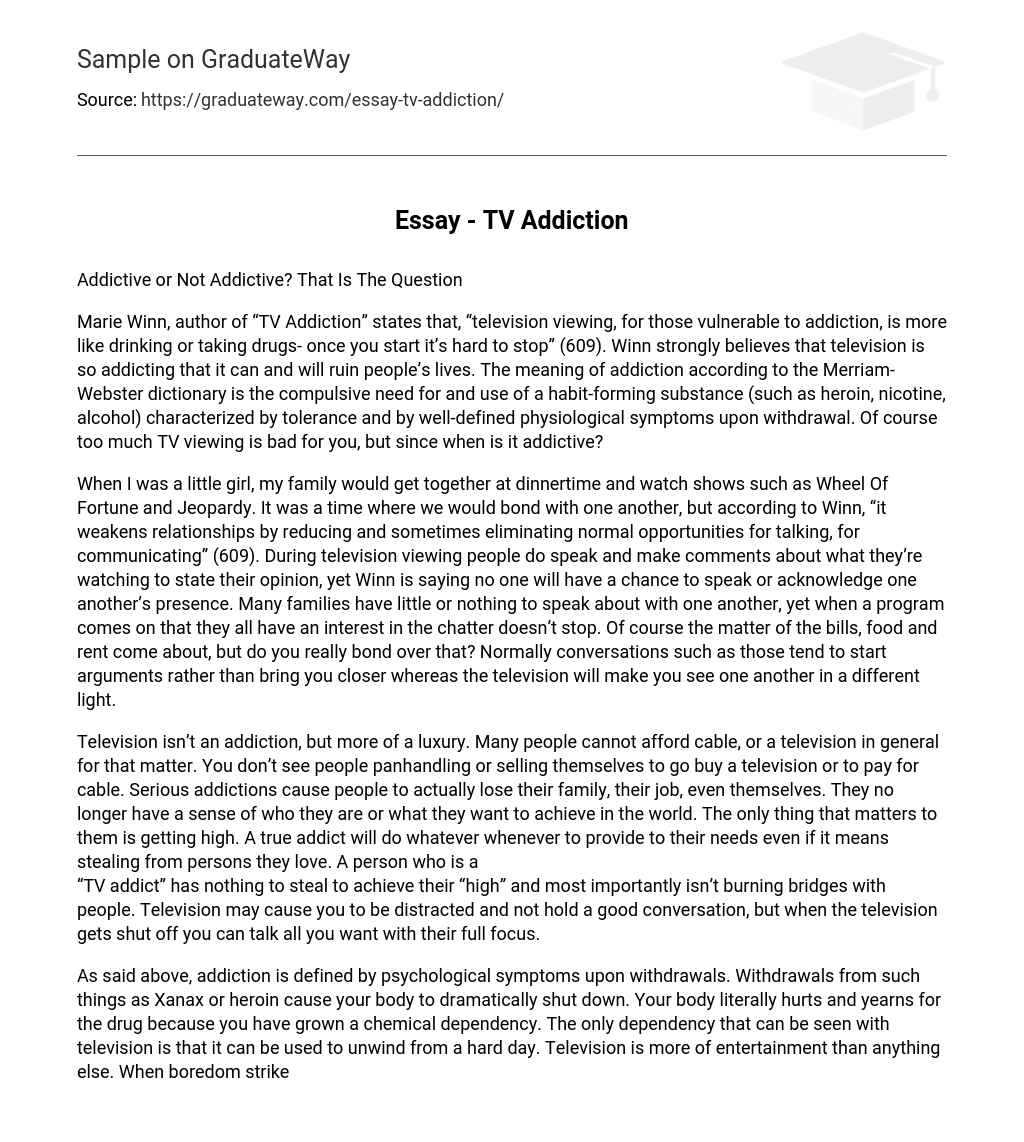Is it addictive or not addictive? That is the question.
According to Marie Winn, the author of “TV Addiction,” television viewing is comparable to substance abuse in the sense that once you start, it becomes difficult to stop. Winn firmly holds the belief that television is so addictive that it has the potential to ruin lives (609). The Merriam-Webster dictionary defines addiction as the compulsive need for and use of a habit-forming substance, such as heroin, nicotine, or alcohol, which is characterized by both tolerance and well-defined physiological symptoms when one attempts to quit. Although excessive television watching is undeniably harmful, when did it become classified as addictive?
As a child, my family would come together during mealtime to watch popular TV game shows like Wheel Of Fortune and Jeopardy. These moments allowed us to connect with one another. However, according to Winn (609), this practice can actually damage relationships by limiting opportunities for communication. While it is true that people may comment on what they are watching, Winn suggests that this alone is insufficient for truly engaging with each other. Many families struggle to find topics of conversation, but when a program of mutual interest airs, the discussion flows effortlessly. On the other hand, conversations about bills, food, and rent often lead to arguments instead of promoting closeness. In contrast, watching television as a group offers an opportunity to perceive each other in a new light.
Television is not an addiction or a necessity, but rather a luxury. Many individuals cannot afford cable or a television in general. Unlike serious addictions, where people lose their family, job, and even their identity, being addicted to television does not lead to such devastating consequences. True addicts will go to great lengths, including stealing from loved ones, to fulfill their needs. On the other hand, a “TV addict” has nothing of value to steal and does not harm relationships. While television may be distracting and hinder meaningful conversations, once it is turned off, one can engage in uninterrupted conversations with full attention.
During withdrawals, addiction manifests psychological symptoms. The body’s yearning for drugs, due to chemical dependency, can lead to severe physical discomfort while withdrawing from substances like Xanax or heroin. In contrast, television acts as a means of amusement and relaxation following a tiring day. When confronted with boredom or limited activities, watching TV aids in passing time. Despite the presence of household chores, errands to be run, or the possibility of taking a stroll in the park, occasionally indulging in couch lounging appears most appealing.
According to Winn, the term “addiction” is frequently misused and even employed humorously, a behavior she admits to. This improper utilization of the word is shameful given that more than twenty-three million Americans are afflicted with addiction as a severe ailment.
Television is not addictive by any means, despite what Winn claims. Like other addictive things, television would have age restrictions if it were truly as addicting as he suggests. This means children would not be able to watch educational shows like Barney that teach and entertain at the same time. While picture books exist, television aids in learning by demonstrating pronunciation and promoting sharing. Sometimes people have strong opinions without considering the advancements of the present era. Shows like these can be highly beneficial. Rather than judging television superficially, it should be evaluated internally like a book. It may become clear that television is not as negative as Winn would lead everyone to believe.





